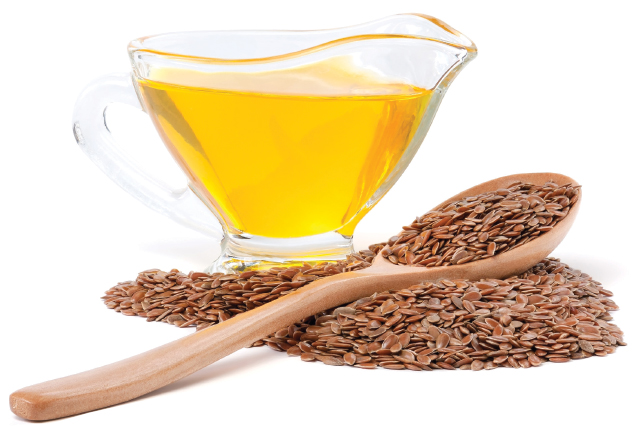The ASCO Post’s Integrative Oncology series is intended to facilitate the availability of evidence-based information on integrative and complementary therapies sometimes used by patients with cancer. In this installment, Ting Bao, MD, DABMA, MS, and Jyothirmai Gubili, MS, focus on flaxseed because of its increasing use in alleviating menopausal symptoms. Flaxseed is a commonly used dietary complement that is rich in omega-3 fatty acids and
phytoestrogens.

Ting Bao, MD, DABMA, MS

Jyothirmai Gubili, MS
Overview
An annual plant, flax is believed to have originated in Egypt and is now cultivated around the world as a source of edible oil and fiber. Both flax seeds and oil have been used in traditional medicine to control menopausal symptoms and to treat constipation, urinary tract infections, coughs, colds, acne, and burns. Currently, flaxseed is used to alleviate menopausal symptoms and constipation, lower cholesterol levels, as a cardioprotective, and as a chemopreventive agent.
Flaxseed is rich in omega-3 fatty acids, which are known to protect against heart disease, arthritis, and inflammatory bowel disease. It also contains phytoestrogens called lignans, which may exert anticancer effects.
Flaxseed is available in the form of whole seeds, oil, capsule, powder, and as linseed cakes in many grocery and health food stores.
The Science
Preliminary findings indicate that flaxseed is equally effective as an oral estrogen-progesterone replacement for improving mild menopausal symptoms in hypercholesterolemic menopausal women,1 and it may help reduce cyclic mastalgia.2 In addition, supplementation with flaxseed along with lifestyle modification was found to be more effective than lifestyle modification alone for managing metabolic syndrome3 and nonalcoholic fatty liver disease.4 Flaxseed was also found to be superior to psyllium for improving symptoms of constipation, weight, and glycemic/lipid levels5; and a major lignan derived from flaxseed was shown to improve glycemic control in patients with type 2 diabetes.6 Findings on the cholesterol-lowering effects of flaxseed have been mixed,1,7 but a major limitation of these studies is small sample size. Larger, well-designed trials are needed to confirm these observations.

Photo credit: Getty
Flaxseed has been investigated for its anticancer potential as well. In preclinical studies, it demonstrated antiproliferative and antimetastatic effects on breast8 and prostate9 cancers, as well as melanoma,10 along with decreasing radiation therapy–induced lung damage and improving survival.11
In an uncontrolled study of 25 patients with prostate cancer, a low-fat (20% of kcal or less), flaxseed-supplemented (30 g/d) diet led to significant reductions in total serum cholesterol, total testosterone, and free androgen index (all P < .05). The mean proliferation index was 7.4 ± 7.8 for historic controls compared with 5.0 ± 4.9 for the diet-treated patients (P = .05).12
In another trial, 32 newly diagnosed patients with breast cancer were randomly assigned to a daily intake of a 25-g, flaxseed-containing muffin or a placebo for 32 days. Researchers reported significant reduction in cell proliferation, an increase in apoptosis, and reduction in c-erbB2 expression of breast cancer cells. The total intake of flaxseed was correlated with changes in c-erbB2 score (r = –0.373, P = .036) and apoptotic index (r = 0.495, P < .004).13
Flaxseed may also help lower serum levels of sex hormones implicated in breast cancer. In a study involving 48 postmenopausal women, consumption of flaxseed (7.5 g/d for the first 6 weeks and 15.0 g/d for an additional 6 weeks) resulted in statistically insignificant declines in estradiol, estrone, and testosterone levels. The reductions were more pronounced in overweight/obese women, especially the estrone level (P = .02),14 although the study is limited by its small sample size and short-term follow-up. However, supplementation with a flaxseed-derived lignan (410 mg for 6 weeks) was ineffective in reducing hot flashes, in a phase III trial of 188 postmenopausal women with or without breast cancer [mean hot flash score was decreased 4.9 in the flaxseed group vs 3.5 in the placebo group (P = .29)].15
Mechanistic studies revealed that lignans contribute to the hormonal effects of flaxseed.16 It may alter estrogen metabolism, increasing the ratio of 2-hydroxyestrogen to 16 alpha-hydroxyestrone in a dose-dependent fashion.17 The laxative effects of flaxseed are thought to be due to its fiber content.18
Further, the antiproliferative and antimetastatic properties of flaxseed were shown to be due in part to downregulation of insulin-like growth factor 1 and expression of the epidermal growth factor receptor.19 Flaxseed also induced apoptosis by significantly upregulating p53 mRNA in breast cancer cell lines.8 In another study, flaxseed oil enhanced the effects of trastuzumab in reducing HER2 signaling via AKT and MAPK pathways, resulting in decreased cell proliferation and enhanced apoptosis.20
In human studies, dietary flaxseed was shown to decrease central aortic blood pressure via changes in plasma oxylipins.21,22 Other findings suggest that the hormonal effects of flaxseed may play a role in modulating prostate cancer biology and associated biomarkers,12 as well as lowering serum lipid levels in postmenopausal women with breast cancer.13 Supplementation with flaxseed has also been reported to increase the luteal phase of the menstrual cycle, although the mechanism has yet to be determined.23
Adverse Effects
Common side effects with flaxseed include increased bowel movements,24 constipation, and flatulence.12
Case Reports
Ingestion of flaxseeds has resulted in anaphylaxis.25,26
Flaxseed supplementation has resulted in false polyposis coli, a significant risk factor for colorectal carcinoma, on a double-contrast barium enema in a 50-year-old woman who took flaxseed for relief of constipation.27
Summary
Flaxseed is a commonly used dietary complement that is rich in omega-3 fatty acids and phytoestrogens. It has been used to protect against heart disease, arthritis, and inflammatory bowel disease, as well as to reduce hot flashes. Clinical evidence is limited due to small sample size and short follow-up in studies conducted thus far. Further well-designed trials are needed for clinical recommendation. Physicians, patients with breast cancer, and survivors with a history of hormone-sensitive cancer need to be aware of the phytoestrogenic effects of flaxseed. ν
DISCLOSURE: Dr. Bao was on the advisory board of Eisai. Ms. Gubili reported no conflicts of interest.
REFERENCES
1. Lemay A, Dodin S, Kadri N, et al: Flaxseed dietary supplement vs hormone replacement therapy in hypercholesterolemic menopausal women. Obstet Gynecol 100:495-504, 2002.
2. Mirghafourvand M, Mohammad-Alizadeh-Charandabi S, Ahmadpour P, et al: Effects of Vitex agnus and flaxseed on cyclic mastalgia: A randomized controlled trial. Complement Ther Med 24:90-95, 2016.
3. Yari Z, Rahimlou M, Poustchi H, et al: Flaxseed supplementation in metabolic syndrome management: A pilot randomized, open-labeled, controlled study. Phytother Res 30:1339-1344, 2016.
4. Yari Z, Rahimlou M, Eslamparast T, et al: Flaxseed supplementation in non-alcoholic fatty liver disease: A pilot randomized, open labeled, controlled study. Int J Food Sci Nutr 67:461-469, 2016.
5. Soltanian N, Janghorbani M: Effect of flaxseed or psyllium vs placebo on management of constipation, weight, glycemia, and lipids: A randomized trial in constipated patients with type 2 diabetes. Clin Nutr ESPEN 29:41-48, 2019.
6. Pan A, Sun J, Chen Y, et al: Effects of a flaxseed-derived lignan supplement in type 2 diabetic patients: A randomized, double-blind, cross-over trial. PLoS One 2:e1148, 2007.
7. Fukumitsu S, Aida K, Shimizu H, et al: Flaxseed lignan lowers blood cholesterol and decreases liver disease risk factors in moderately hypercholesterolemic men. Nutr Res 30:441-446, 2010.
8. Lee J, Cho K: Flaxseed sprouts induce apoptosis and inhibit growth in MCF-7 and MDA-MB-231 human breast cancer cells. In Vitro Cell Dev Biol Anim 48:244-250, 2012.
9. Lin X, Gingrich JR, Bao W, et al: Effect of flaxseed supplementation on prostatic carcinoma in transgenic mice. Urology 60:919-924, 2002.
10. Yan L, Yee JA, Li D, et al: Dietary flaxseed supplementation and experimental metastasis of melanoma cells in mice. Cancer Lett 124:181-186, 1998.
11. Christofidou-Solomidou M, Tyagi S, Tan KS, et al: Dietary flaxseed administered post thoracic radiation treatment improves survival and mitigates radiation-induced pneumonopathy in mice. BMC Cancer 11:269, 2011.
12. Demark-Wahnefried W, Price DT, Polascik TJ, et al: Pilot study of dietary fat restriction and flaxseed supplementation in men with prostate cancer before surgery: Exploring the effects on hormonal levels, prostate-specific antigen, and histopathologic features. Urology 58:47-52, 2001.
13. Thompson LU, Chen JM, Li T, et al: Dietary flaxseed alters tumor biological markers in postmenopausal breast cancer. Clin Cancer Res 11:3828-3835, 2005.
14. Sturgeon SR, Heersink JL, Volpe SL, et al: Effect of dietary flaxseed on serum levels of estrogens and androgens in postmenopausal women. Nutr Cancer 60:612-618, 2008.
15. Pruthi S, Qin R, Terstreip SA et al: A phase III, randomized, placebo-controlled, double-blind trial of flaxseed for the treatment of hot flashes: North Central Cancer Treatment Group N08C7. Menopause 19:48-53, 2012.
16. Hutchins AM, Martini MC, Olson BA, et al: Flaxseed influences urinary lignan excretion in a dose-dependent manner in postmenopausal women. Cancer Epidemiol Biomarkers Prev 9:1113-1118, 2000.
17. Haggans CJ, Hutchins AM, Olson BA, et al: Effect of flaxseed consumption on urinary estrogen metabolites in postmenopausal women. Nutr Cancer 33:188-195, 1999.
18. Dahl WJ, Lockert EA, Cammer AL, et al: Effects of flax fiber on laxation and glycemic response in healthy volunteers. J Med Food 8:508-511, 2005.
19. Chen J, Stavro PM, Thompson LU. Dietary flaxseed inhibits human breast cancer growth and metastasis and downregulates expression of insulin-like growth factor and epidermal growth factor receptor. Nutr Cancer 43:187-192, 2002.
20. Mason JK, Fu M, Chen J, et al: Flaxseed oil enhances the effectiveness of trastuzumab in reducing the growth of HER2-overexpressing human breast tumors (BT-474). J Nutr Biochem 26:16-23, 2015.
21. Caligiuri SP, Aukema HM, Ravandi A, et al: Flaxseed consumption reduces blood pressure in patients with hypertension by altering circulating oxylipins via an alpha-linolenic acid-induced inhibition of soluble epoxide hydrolase. Hypertension 64:53-59, 2014.
22. Caligiuri SP, Rodriguez-Leyva D, Aukema HM, et al: Dietary flaxseed reduces central aortic blood pressure without cardiac involvement but through changes in plasma oxylipins. Hypertension 68:1031-1038, 2016.
23. Phipps WR, Martini MC, Lampe JW, et al: Effect of flax seed ingestion on the menstrual cycle. J Clin Endocrinol Metab 77:1215-1219, 1993.
24. Cunnane SC, Hamadeh MJ, Liede AC, et al: Nutritional attributes of traditional flaxseed in healthy young adults. Am J Clin Nutr 61:62-68, 1995.
25. León F, Rodríguez M, Cuevas M: Anaphylaxis to Linum. Allergol Immunopathol 31:47-49, 2003.
26. Alvarez-Perea A, Alzate -Pérez D, Doleo Maldonado A, et al: Anaphylaxis caused by flaxseed. J Investig Allergol Clin Immunol 23:446-447, 2013.
27. Petty DR, Mannion RA: A case of multiple linseeds mimicking polyposis coli on double contrast barium enema. Clin Radiol 58:87-88, 2003.

